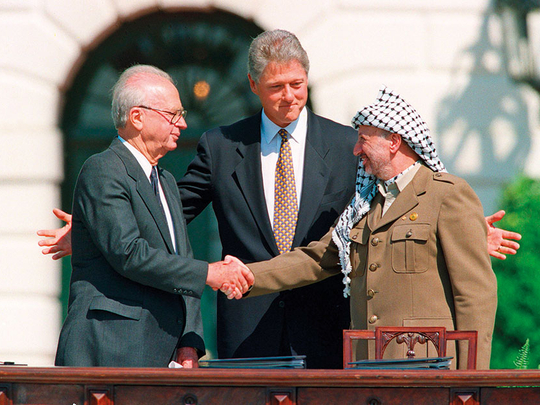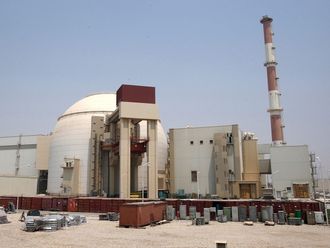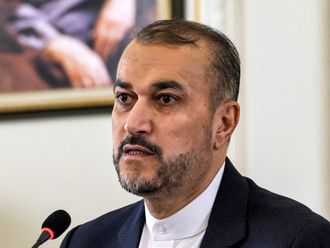
Occupied Jerusalem - A handshake on the White House lawn sealing the first of the landmark Oslo accords inspired hope that Israeli-Palestinian peace could finally be achieved, but 25 years later those dreams have faded.
The September 13 anniversary of the 1993 accord, symbolised by the handshake between Yitzhak Rabin and Yasser Arafat, will not be celebrated by many who see the process as unfulfilled or flawed from the very start.
For those who regard an Israeli and Palestinian state existing side-by-side as the only viable solution, salvaging the peace process and the achievements of the Oslo accords - a second followed in 1995 - is more urgent than ever.
“It was a defining moment for many of us,” said Gaith Al Omari, a Palestinian student in Jordan at the time and now a senior fellow at The Washington Institute for Near East Policy think-tank.
“There was a lot of hope - maybe naive hope, but certainly a lot of hope.”
Al Omari, who served as an adviser to Palestinian negotiators in later talks, has no illusions about the current state of the peace process.
“On the long-term, there is no solution except the two-state solution,” he told AFP.
“In the short-term, there is absolutely no chance that it’s going to happen.”
His view is widely shared, with Al Omari and others pointing to what they see as Israel’s drift to the political right, a weakened Palestinian leadership and US President Donald Trump’s moves.
Trump has pledged to reach the “ultimate deal” - Israeli-Palestinian peace - but has declined to commit to a two-state solution, for years the focus of international diplomacy.
He has also sided with Israel on core issues in the conflict, such as recognising occupied Jerusalem as its capital, while publicly asking for no concessions in return.
Those moves have delighted Israeli right-wing politicians who oppose a Palestinian state.
But the Palestinians, who have cut off contact with Trump’s White House, say the Israeli occupation regime failed to abide by the accords - notably by allowing hundreds of thousands more colonists in the West Bank, which it has occupied since 1967.
Their leadership, however, remains deeply divided between 83-year-old president Mahmoud Abbas’s Fatah party and Hamas, which controls the Gaza Strip and refuses to recognise Israel.
The Oslo accord of 1993 stated that “it is time to put an end to decades of confrontation and conflict” and “strive to live in peaceful coexistence”.
While it did not specifically mention the creation of a Palestinian state, it led to mechanisms for self-governance, including the Palestinian National Authority, which has endured.
As part of the agreements, the Palestine Liberation Organisation recognised Israel, while Israel recognised the PLO as the Palestinians’ legitimate representative.
That in itself was a major achievement at the time, following decades of enmity.
In 1994, then Israeli prime minister Rabin, PLO chairman Arafat and Israeli foreign minister Shimon Peres shared the Nobel peace prize.
But since, Israelis and Palestinians have been scarred by further tragedy.
Rabin was assassinated by an Israeli right-wing extremist in 1995 and the five-year transitional period under Oslo that was supposed to lead to a permanent settlement expired with no deal in place.
A second Palestinian intifada erupted in 2000, and since Hamas took control of the Gaza Strip in 2007, the Israeli regime has launched three wars on Gaza.
Israeli colony building has multiplied in the West Bank - on land the Palestinians see as part of their future state.
Some 600,000 Jewish colonists now live there and in occupied east Jerusalem, which the Palestinians want as their capital.
Prime Minister Benjamin Netanyahu also now heads what is seen as the most right-wing government in Israel’s history.
Key members of his coalition want to see most of the West Bank become part of Israel despite warnings that it would lead to an “apartheid” arrangement with the Palestinians there.












